| Reviews & Columns |
|
Reviews DVD TV on DVD Blu-ray 4K UHD International DVDs In Theaters Reviews by Studio Video Games Features Collector Series DVDs Easter Egg Database Interviews DVD Talk Radio Feature Articles Columns Anime Talk DVD Savant Horror DVDs The M.O.D. Squad Art House HD Talk Silent DVD
|
DVD Talk Forum |
|
|
| Resources |
|
DVD Price Search Customer Service #'s RCE Info Links |
|
Columns
|
|
|
Carnivale: Complete First Season
INTRODUCTION:
"Before the beginning, after the great war between Heaven and Hell, God created the Earth and gave dominion over it to the crafty ape he called Man. And to each generation was born a creature of light and a creature of darkness; and great armies clashed by night in the ancient war between good and evil. There was magic then, nobility, and unimaginable cruelty. And so it was until the day that a false sun exploded over Trinity, and man forever traded away wonder for reason ..."
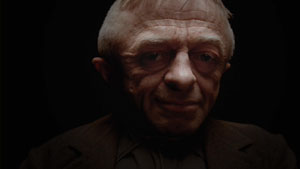
Set against the backdrop of 1930's America, an era marked by the Great Depression and agricultural ruin on a Biblical scale, Carnivàle follows the story of two men whose lives are greatly affected by the drought and sandstorms sweeping across the nation. Ben Hawkins (Nick Stahl) is a soft-spoken fugitive living on a desolate Oklahoma farm ravaged by the Dust Bowl and its extreme weather conditions. After tending to his mother's final days battling the "dust pneumonia", he is picked up by a traveling carnival where he earns his keep as a "roustie" (manual laborer). Brother Justin Crowe (Clancy Brown) is a small town Methodist preacher in Mintern, California. Raised in the church, he is a devoted servant to both God and his community and is trying to raise money and support to bring a place of worship to the countless poor Okies filtering in from the Great Plains. These two men are linked, both by mysterious dreams and unexplainable abilities, and as their story progresses it becomes clear they are destined for much greater things.
CONTENT:
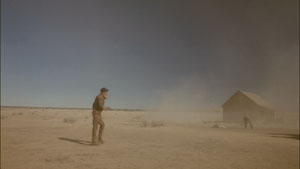 At its finest, television presents the unique opportunity to tell stories that could not exist in any other form. Sadly, much of that promise is wasted, but in recent years, HBO has boldly led the way in developing powerful and compelling programming unlike anything the viewing audience has ever seen before. Carnivàle is just such a show. While it's tempting to draw comparisons to series like Twin Peaks, Carnivàle stands apart with a bold and stylistic vision, bringing a unique perspective to the age-old battle between good and evil.
At its finest, television presents the unique opportunity to tell stories that could not exist in any other form. Sadly, much of that promise is wasted, but in recent years, HBO has boldly led the way in developing powerful and compelling programming unlike anything the viewing audience has ever seen before. Carnivàle is just such a show. While it's tempting to draw comparisons to series like Twin Peaks, Carnivàle stands apart with a bold and stylistic vision, bringing a unique perspective to the age-old battle between good and evil.
The series begins with a simple yet haunting narration from a character we will soon come to know as Samson (Michael J. Anderson). It immediately and succinctly sets the stage for the entire show, telling the audience not only the basic premise of the plot but the type of world we are about to enter. Samson is a diminutive man with a pronounced limp, a former sideshow attraction who now presides over the day-to-day operations of this particular outfit, and he is just one of many mysterious residents of the carnival where a significant portion of the show takes place. The year is 1934, and much of America's Midwestern landscape has been torn apart by savage sandstorms and drought, creating not just an economic depression but an emotional one as well. For most of the inhabitants of the towns on this traveling carnival's path, life is a painful struggle, but they are happy to give what little money they have to Samson and his crew, if only to escape the dullness of their lives for one evening and experience something magical and wondrous.
Much of the success of Carnivàle stems from the intricate and fascinating world the show creates, from the company of performers down to the structure and inner workings of the carnival itself. Samson supervises the overall carnival, including talent and finances, while his right-hand man Clayton "Jonesy" Jones (Tim DeKay) is in charge of the rousties, who are the backbone of the physical and mechanical operations. Along with typical rigged games and the obligatory ferris wheel, the carnival features a giant, a strong man, a snake charmer, a tarot card reader, Siamese twins, the bearded lady, a reptile man, a blind mentalist, and everyone's favorite ... the Cootch Show. However, these aren't simply background characters used to create atmosphere; they are the heart and soul of the show, and each one plays an essential role in the building story.
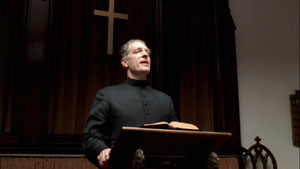 Part of what makes this carnival so interesting is the way it blends old-fashioned parlor tricks and carny schemes with the genuine supernatural abilities of the performers. Ruthie (Adrienne Barbeau) is a "snake charmer" ostensibly taunting fate with deadly creatures who could kill in an instant. In reality, the snakes are harmless, but with a curvaceous body and a strong presentation, the customers are nonetheless entranced by her performance. Lodz (Patrick Bauchau), on the other hand, is a "mentalist" who on the surface appears to be little more than a clever cold reader, but his abilities as a medium, not to mention reading the dreams of others, go far beyond what is seen in his act. Along the same lines, Apollonia (the psychic) is more than capable of revealing volumes of information about her customers, but what they really want is vaguely uplifting predictions of their future, so that's what they get ... mostly. The entire carnival is a clever balancing act, giving the patron just enough to get his money, but not so much as to frighten him away. Sometimes the money comes from lifting people's wallets as they're strapped into the ferris wheel, and sometimes it comes from the legitimate supernatural abilities of the featured acts. If it makes money, Samson puts it in the show, even if (as he admits with Lodz's act) he doesn't really understand how it works.
Part of what makes this carnival so interesting is the way it blends old-fashioned parlor tricks and carny schemes with the genuine supernatural abilities of the performers. Ruthie (Adrienne Barbeau) is a "snake charmer" ostensibly taunting fate with deadly creatures who could kill in an instant. In reality, the snakes are harmless, but with a curvaceous body and a strong presentation, the customers are nonetheless entranced by her performance. Lodz (Patrick Bauchau), on the other hand, is a "mentalist" who on the surface appears to be little more than a clever cold reader, but his abilities as a medium, not to mention reading the dreams of others, go far beyond what is seen in his act. Along the same lines, Apollonia (the psychic) is more than capable of revealing volumes of information about her customers, but what they really want is vaguely uplifting predictions of their future, so that's what they get ... mostly. The entire carnival is a clever balancing act, giving the patron just enough to get his money, but not so much as to frighten him away. Sometimes the money comes from lifting people's wallets as they're strapped into the ferris wheel, and sometimes it comes from the legitimate supernatural abilities of the featured acts. If it makes money, Samson puts it in the show, even if (as he admits with Lodz's act) he doesn't really understand how it works.
Offsetting the hectic and grimy lifestyle of the carnival is the story of Brother Justin Crowe and his ministry in the small California town of Mintern. Along with his sister Iris (Amy Madigan), he was raised in a Methodist orphanage after the death of his parents in a train crash. The two of them live a very modest life working together to bring the word of God to his congregation, and he is well respected by his community. The troubled times across the southern plains, however, are bringing many impoverished migrants to town, and the locals aren't too pleased with the crowded services, a feeling enhanced by their general prejudice and distaste for the poor. Justin's attempts to help these new worshipers has him at odds with the community leadership, but his passion to provide for these people and his tireless efforts on their behalf helps him realize that carny folk aren't the only ones with unique gifts.
Enhancing the cast of interesting and mysterious characters is the overall production value of the show itself. The creators have remarked that it's quite possibly television's most ambitious undertaking, and it's pretty difficult to argue with that assessment. From set design to costuming to art direction to cinematography, the level of detail that goes into each scene is staggering, and the realism is such that after watching an episode I feel almost compelled to take a shower and cleanse myself of all the dirt kicked up throughout the hour. It's a beautiful and yet depressing display, and if I weren't so entrenched in the characters and plot, I could find enjoyment simply staring in awe at the remarkable visual accomplishment.
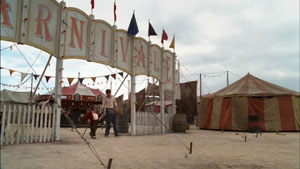 Visual style and an intriguing story can only take a show so far, especially when so much depends on characterization. Thankfully, the casting department really hit the nail on the head with these actors. As the two leads, Nick Stahl and Clancy Brown are nothing short of brilliant. Ben Hawkins is a very isolated and quiet character, and yet he carries a significant part of the series on his shoulders. Without the right actor it could be disastrous, but Stahl brings a level of thoughtful emotion to the character such that a glance or a stare speaks volumes. Brown also has a difficult task capturing the duality of Brother Justin, a man who presents a physically intimidating presence but who wants little more than to be a subdued and loyal servant of his Lord, and he succeeds on every level. Amy Madigan, Tim DeKay, and Clea Duvall are also fantastic choices. Physically, they look like they belong in the 1930's in the first place, and each is such a fantastic actor that it's almost impossible to imagine anyone else could play these characters. While there are two clear lead characters, Carnivàle is still very much an ensemble show, and the performances of all the supporting characters are essential to the show's success. Particularly inspired is the voice of Linda Hunt as the decidedly creepy "Management" and John Savage as Henry Scudder, a presence from the past who seems connected to everything and everyone.
Visual style and an intriguing story can only take a show so far, especially when so much depends on characterization. Thankfully, the casting department really hit the nail on the head with these actors. As the two leads, Nick Stahl and Clancy Brown are nothing short of brilliant. Ben Hawkins is a very isolated and quiet character, and yet he carries a significant part of the series on his shoulders. Without the right actor it could be disastrous, but Stahl brings a level of thoughtful emotion to the character such that a glance or a stare speaks volumes. Brown also has a difficult task capturing the duality of Brother Justin, a man who presents a physically intimidating presence but who wants little more than to be a subdued and loyal servant of his Lord, and he succeeds on every level. Amy Madigan, Tim DeKay, and Clea Duvall are also fantastic choices. Physically, they look like they belong in the 1930's in the first place, and each is such a fantastic actor that it's almost impossible to imagine anyone else could play these characters. While there are two clear lead characters, Carnivàle is still very much an ensemble show, and the performances of all the supporting characters are essential to the show's success. Particularly inspired is the voice of Linda Hunt as the decidedly creepy "Management" and John Savage as Henry Scudder, a presence from the past who seems connected to everything and everyone.
It is often said that television is a "writer's medium", and there's no doubt that Daniel Knauf's story is the driving force of this show, but I must comment on director Rodrigo Garcia. In recent years, I've come to the belief that he's among the best two or three directors working in television today, and he really shines with this series. Tasked with directing 4 of the 12 episodes, including the pilot and season finale, significant aspects of this series are very likely due to his influence. As they discuss on the commentary track for the pilot episode, there was a lot of uncertainty with how to pace the episodes as well as how to film these incredibly complicated concepts. Garcia's work on that episode became the template for everyone else to follow, and the series benefits greatly from his participation. The number of characters and ideas that are crammed into that first episode is really quite remarkable, but with the help of Knauf's skilled writing, he deftly weaves all this information into a compelling, and yet surprisingly coherent, introduction to the show. In television, directors typically work on an episode here and there based on scheduling time constraints, so having such a talented individual involved early in the creative process and directing a full third of the series' episodes really elevates the overall quality of the finished product.
The first season of Carnivàle includes the following 12 episodes spread across 6 discs:
- 1.01 - Milfay (09.14.03)
- Commentary by Series Creator/Executive Producer Daniel Knauf, Executive Producer Howard Klein, and Director Rodrigo Garcia
- 1.02 - After the Ball is Over (09.21.03)
- Commentary by Series Creator/Executive Producer Daniel Knauf, Executive Producer Howard Klein, and Director Jeremy Podeswa
- 1.03 - Tipton (09.28.03)
- 1.04 - Black Blizzard (10.05.03)
- 1.05 - Babylon (10.12.03)
- 1.06 - Pick a Number (10.19.03)
- 1.07 - The River (10.26.03)
- 1.08 - Lonnigan, Texas (11.02.03)
- 1.09 - Insomnia (11.09.03)
- 1.10 - Hot and Bothered (11.16.03)
- Commentary by Series Creator/Executive Producer Daniel Knauf, Executive Producer Howard Klein, and Director Jeremy Podeswa
- 1.11 - The Day of the Dead (11.23.03)
- 1.12 - The Day That was the Day (11.30.03)
- Featurette: "The Making of Carnivàle"
I must admit that this is a very difficult review to write. In many ways, Carnivàle is as maddening as it is fascinating. In fact, at this time, I cannot think of show that demands more from its audience than this one. It demands patience as well as a disciplined attention to detail. Even the smallest scene carries significant importance, and cryptic clues are doled out at a very high frequency. Without paying close attention, it's tempting to assume that the show is unnecessarily cryptic and misleading, but watching these episodes for the second time on DVD, I am confident that this is most certainly not the case. There is definitely a rhyme and reason to what at first glance may seem confusing just for the sake of being that way, and the perceptive viewer is well rewarded for his patience. Still, there are for more clues than resolutions, as this first season can aptly be described as "positioning the pieces." As Samson states in the season's penultimate episode, "Somethin's buildin', kid. I can feel it." There is definitely something major on the horizon, and these first 12 episodes are in large part a setup for the next phase.
Were this Babylon 5, I could tell you without hesitation that the first season was absolutely essential, and everything you could possibly desire would be paid off in triplicate during the second through fourth seasons. Were this The X-Files, I could tell you that the mythology would meander around for nearly a decade to the point where what once seemed brilliantly fascinating had devolved into something closer to frustrating and annoying and by the 9th season finale, ultimately unsatisfying. With Carnivàle, however, I cannot say what is to come. I can only have faith that the payoff is as good as the setup. Judging from the consistent quality level for each of the 12 episodes in this first season as well as HBO's track record for mostly only airing a show as long as it remains compelling, not to mention the fact that there isn't the typical padding you find in a show that runs 20+ episodes a year, I do have faith that the second season will continue building on the momentum established in this set and ultimately provide a satisfying resolution. If not, I'll certainly be quite disappointed, as this first season establishes a fascinatingly cryptic and yet oddly coherent canvas, and I cannot wait to see the next chapter of this tale.
PRESENTATION:
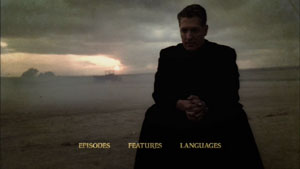 The complete first season of Carnivàle is presented in a casing reminiscent of a finely bound novel. The outer slipcover is made of a thick cardboard and displays a creative rendering of the show's colorful characters. It houses a textured fold-out unit that is intended to look and feel like the covering on a classic novel. Each panel contains a single disc, in addition to images and information about the particular episodes. The inner panels are cut to a different height than the cover, likely to maintain the book-like feel; however, this makes it such that standing the set in a vertical position places strain on those inner pages, and it's conceivable that they will exhibit wear over the years. That said, the artwork is beautiful, and it will look great on a shelf in either a vertical or horizontal placement.
The complete first season of Carnivàle is presented in a casing reminiscent of a finely bound novel. The outer slipcover is made of a thick cardboard and displays a creative rendering of the show's colorful characters. It houses a textured fold-out unit that is intended to look and feel like the covering on a classic novel. Each panel contains a single disc, in addition to images and information about the particular episodes. The inner panels are cut to a different height than the cover, likely to maintain the book-like feel; however, this makes it such that standing the set in a vertical position places strain on those inner pages, and it's conceivable that they will exhibit wear over the years. That said, the artwork is beautiful, and it will look great on a shelf in either a vertical or horizontal placement.
The video is presented in a 16:9 aspect ratio, and while it's obviously not as crisp as the high definition broadcasts, it looks fantastic and is much better than the DirecTV feeds I saved from the original run. This show often uses a dark palette, so you don't want to watch it in an overly lit room with low contrast, but properly calibrated the reds and browns are well defined and the dark and creepy scenes are very effective. Included are 4 audio tracks: English, French, and Spanish in stereo as well as a 5.1 English track. Unlike some other series, the 5.1 track is not gratuitous, and in certain scenes it presents a worthy distinction. The dialogue and effects are balanced well, and I never felt like I was fighting a battle between clearly hearing the dialogue and not being overwhelmed by the effects. Even the background sounds of the wind sweeping across the plains are clear but not distracting.
WHISTLES & BELLS:
This set includes 3 audio commentaries and 1 short featurette. The first commentary for the pilot episode "Milfay" is with the show's creator and primary writer Daniel Knauf as well as Executive Producer Howard Klein and the episode's director Rodrigo Garcia. Most of the discussion is between Garcia and Knauf, and it is well worth listening to. As I've indicated, I believe Garcia to be one of the best directors working in television today, so to hear his thoughts and approach to the series is fascinating. The two give quite a bit of insight into the casting process and the many forms the pilot took before it was finally ready to carry the series.
The second commentary (on "After the Ball is Over") also features Knauf and Klein, this time with director Jeremy Podeswa. The energy and tone of the discussion is decidedly different for this commentary, and they take a more laid back approach. It still is very interesting, especially to hear the opinions of another director, and these first two commentaries complement one another very well. The third commentary for "Hot and Bothered" feels like an afterthought. It's as if they decided that since the three of them were already in the room, they may as well just do another commentary. It's almost a complete waste and provides very little. While a solid episode, it's certainly not the one I would have chosen for a third commentary, and I would have much rather heard more from Garcia, particularly on the season finale "The Day That was the Day", perhaps the best episode of the series to date.
The featurette is the standard HBO promotion piece. It contains interviews with most of the stars and producers and runs about 12 minutes. It gives a pretty solid background for the series and would probably be a good way to try and convince a new viewer to take a chance on this show. Other than that, though, it doesn't add too much additional insight, except in the area of costuming and set design where we get an idea of how much work really went into this production. It's certainly worth watching after completing the season, but it's hardly anything special.
One nice touch that I very much appreciated is the "Previously On" and "Next On" clips. They are isolated from the main episode track but can be easily accessed from the menus. All DVD releases of television shows should include this material, but since they don't, I find I'm very appreciative of the ones that do.
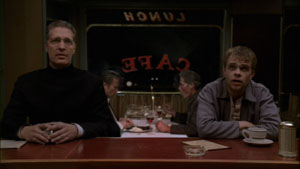
CONCLUDING THOUGHTS:
Carnivàle is an incredibly ambitious undertaking that demands more from its audience than many are willing to invest. While I found it immensely enjoyable, even moreso on the second viewing where the episodes flow back-to-back like chapters in a novel, I can see how it will not have the same effect on everyone. The world created in this show is often drab and depressing, and the mythology it builds requires a very attentive viewer to avoid getting buried under the intricacies of the story. That said, if you are intrigued by stories about the battle between good and evil, you feel comfortable with a plot that develops with a deliberate and character-driven pace, and you can appreciate one of most impressive visual presentations ever on television, the first season of Carnivàle is an absolutely captivating program, and I Highly Recommend it.
|
| Popular Reviews |
| Sponsored Links |
|
|
| Sponsored Links |
|
|
| Release List | Reviews | Shop | Newsletter | Forum | DVD Giveaways | Blu-Ray | Advertise |
|
Copyright 2024 DVDTalk.com All Rights Reserved. Legal Info, Privacy Policy, Terms of Use,
Manage Preferences,
Your Privacy Choices | |||||||













